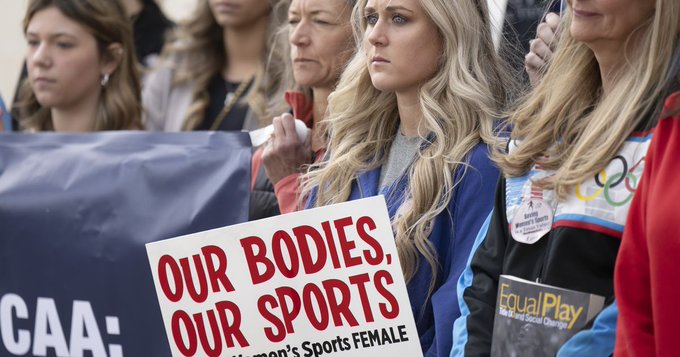In a groundbreaking legal battle, more than a dozen female athletes have taken on the National Collegiate Athletic Association (NCAA) over its transgender participation policy. The lawsuit alleges that the NCAA’s current stance violates Title IX rights, which prohibit sex-based discrimination in federally funded institutions.
The NCAA’s Transgender Participation Policy
The controversy centres around the NCAA’s January 2022 ruling, which permits transgender athletes to compete in the category of their affirmed gender on a sport-by-sport basis. While the policy aims to promote inclusivity and opportunity, critics argue that it creates an uneven playing field. The lawsuit contends that the NCAA has failed to adequately balance fairness, inclusion, and safety for all athletes.
The debate over transgender athletes in women’s sports has taken a legal turn. A group of more than a dozen female athletes have filed a lawsuit against the National Collegiate Athletic Association (NCAA) challenging its transgender participation policy. This lawsuit adds a new layer of complexity to the ongoing discussion about fairness and inclusion in athletics.
The lawsuit, filed in federal court, alleges that the NCAA’s current transgender participation policy violates Title IX, a federal law that prohibits discrimination based on sex in educational programs receiving federal funding. The athletes claim that the policy allows transgender women who were born male to compete in women’s sports, giving them an unfair advantage due to biological factors developed during puberty.
The science of transgender participation in sports is a complex and evolving field. Studies suggest that some physical advantages, such as muscle mass and bone density, might persist after hormone therapy. However, the degree of advantage and its impact on competition varies depending on the sport and the individual athlete.
The NCAA currently allows transgender women to compete in women’s sports after undergoing one year of hormone therapy. This policy is based on the belief that hormone therapy sufficiently mitigates any biological advantages. However, the lawsuit suggests that the athletes believe this policy is inadequate.
The lawsuit has reignited the debate about transgender inclusion in sports. Supporters of the lawsuit argue that protecting fairness in women’s sports is paramount. Opponents argue that the lawsuit is discriminatory and unfairly targets transgender athletes.
Finding a balance between inclusion and fairness is a major challenge for the NCAA and sporting bodies worldwide.
ALSO READ: Odell Beckham Jr. Eyes Miami Dolphins Visit Amidst Romance Rumors

